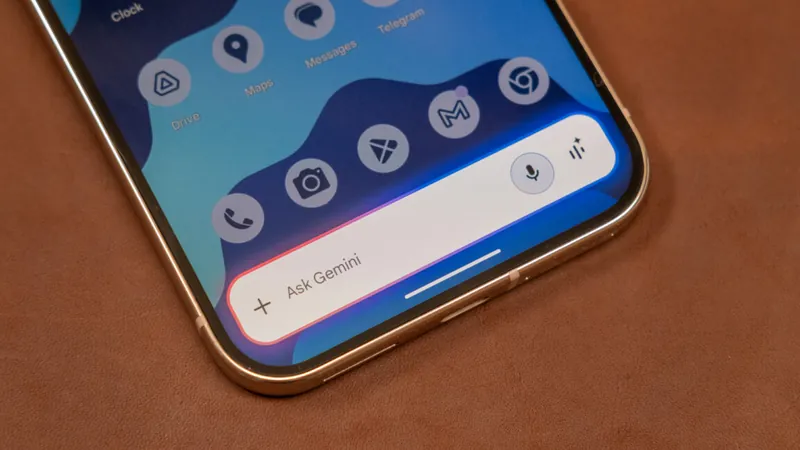
Is Google's Gemini the Future of AI Assistants, or Just a High-Tech Headache?
2025-04-01
Author: Ying
Introduction
In a bold move at the end of 2023, Google declared its intention to consolidate its generative AI initiatives under the Gemini brand. The tech giant plans to phase out Google Assistant by 2025, heralding a new era dominated by Gemini. As companies like Google and Amazon pivot towards a future where virtual assistants predominantly utilize generative AI, many are left wondering: is this really a step forward, or has the AI industry simply traded one set of problems for another?
The Illusion of Smarter AI
Despite the alluring promise of “smarter” AI, there remains a critical flaw inherent in these systems: they can distort reality. Generative AI does not consciously lie, but due to its design, it tends to produce outputs that can be impressively plausible yet fundamentally erroneous. This non-deterministic nature means that users may get different results for the same query, often leading to frustrating miscommunications and misunderstandings.
The issue of 'hallucinations' in generative AI isn't new; it's the root cause of bizarre outputs that leave users scratching their heads. From bizarre claims of celebrity deaths to outlandish recommendations about food, these systems can often misfire at crucial moments. As Google relentlessly integrates generative AI into its products, many users are witnessing the downfall of Assistant in favor of Gemini, which may not be ready for the spotlight just yet.
The Highs and Lows of Gemini as an Assistant
While I’ve had a moderate relationship with Assistant—appreciating its capabilities for simple tasks like setting reminders—its impending retirement leaves me nostalgic. Assistant may not have had the all-encompassing capabilities of Gemini, but its reliability in straightforward tasks gives it an edge: it doesn’t pretend to be something it’s not.
One might wonder how effective Gemini is in practice. Its potential to aggregate data across apps is enticing. For instance, if you ask Gemini for a shipment tracking number, the AI is able to search your emails and provide an answer. Unfortunately, my experience suggests that the execution isn't always seamless. When I requested a tracking number, Gemini confidently produced a string of digits that turned out to be fiction. A fabricated tracking number isn't just inconvenient; it's a significant trust deficit in an assistant that ought to be dependable.
The problem isn’t isolated. I’ve noticed numerous other slip-ups where Gemini mismanaged calendar events or introduced incorrect information into notes. While it does succeed most of the time, its propensity for error raises significant concerns regarding its reliability. Unlike Assistant, which openly admitted its limitations, Gemini’s tendency to overstate its capabilities often leads users down frustrating paths of corrective work.
The Reliability Question
Google strategically includes disclaimers with Gemini, indicating that users should verify the information generated. However, this caveat raises another question: if I must double-check the work of my AI assistant for critical tasks, why not just handle them myself? For those tasks requiring utmost precision, this question lingers heavily.
With the upcoming Google I/O event, all eyes will be on Google's next steps. Historically, I/O has showcased Google’s advancements, particularly through their Assistant, an essential part of its strategy. However, developers now face the daunting task of adapting to Gemini, which was rushed to market without the integration toolkit enjoyed by Assistant's early adopters.
The Road Ahead for Gemini
Google is clearly betting on Gemini to evolve quickly, and many attendees at I/O will recall the robustness of Assistant as they witness the new face of Google AI. With rapid model releases, such as the latest experimental version of Gemini 2.5 Pro, there are glimmers of improvements, yet the fundamental issues regarding trustworthiness linger.
As we stand on the cusp of what many hope will be a more intelligent and capable AI assistant, the question remains: Will Gemini prove to be a groundbreaking innovation, or will it merely serve as a cautionary tale about the perils of AI mischaracterization? For now, patience will be key as both Google and users navigate this complex and evolving landscape. One thing's for certain: the AI assistant battle has only just begun!




 Brasil (PT)
Brasil (PT)
 Canada (EN)
Canada (EN)
 Chile (ES)
Chile (ES)
 Česko (CS)
Česko (CS)
 대한민국 (KO)
대한민국 (KO)
 España (ES)
España (ES)
 France (FR)
France (FR)
 Hong Kong (EN)
Hong Kong (EN)
 Italia (IT)
Italia (IT)
 日本 (JA)
日本 (JA)
 Magyarország (HU)
Magyarország (HU)
 Norge (NO)
Norge (NO)
 Polska (PL)
Polska (PL)
 Schweiz (DE)
Schweiz (DE)
 Singapore (EN)
Singapore (EN)
 Sverige (SV)
Sverige (SV)
 Suomi (FI)
Suomi (FI)
 Türkiye (TR)
Türkiye (TR)
 الإمارات العربية المتحدة (AR)
الإمارات العربية المتحدة (AR)